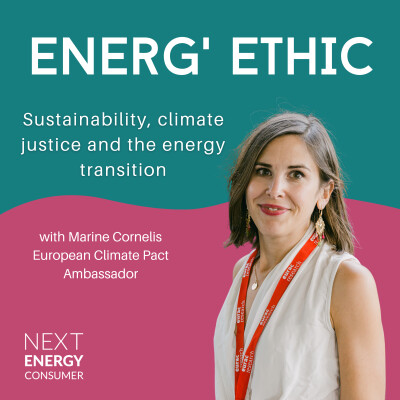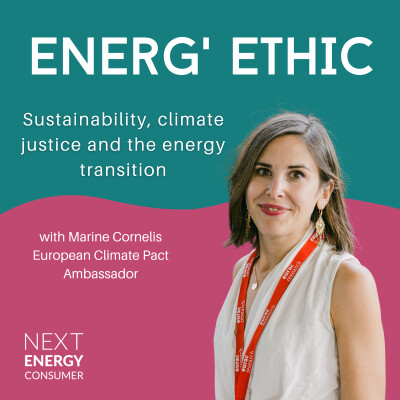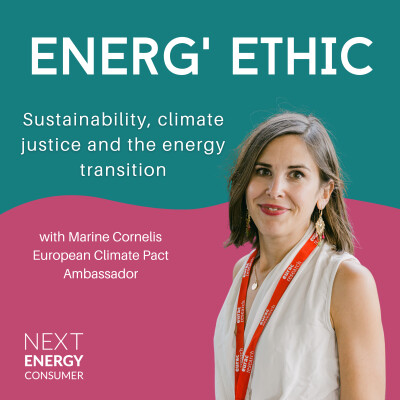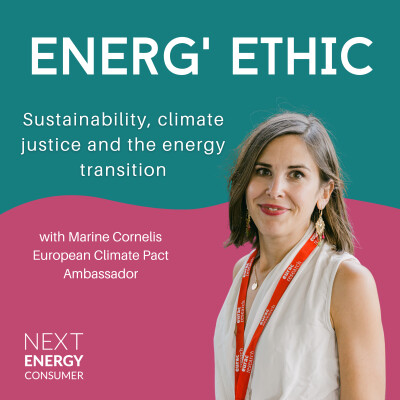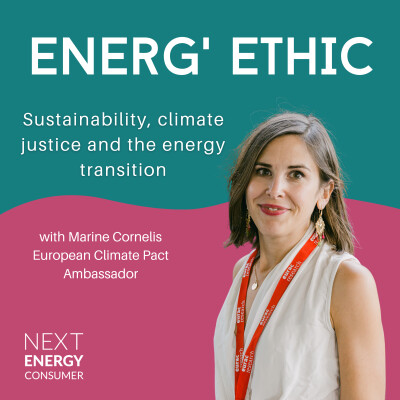- Speaker #0
We don't have ethical banks. The banks don't want to finance energy communities. We don't have too many energy communities. They find it anyway business risky. And the funding from the European Union are very limited, almost inexistent. But we had a lot of achievement with this project. We had some advocacy group to the Ministry of Energy level. So we asked for funding, we asked for... We collaborated with the ethical bank we have to create a social fund for energy communities. We had a small project realized by our community in one kindergarten, and we want to scale this up.
- Speaker #1
The energy transition is happening, but is it fair?
- Speaker #2
Is it working for people like you and me, or just for big market players?
- Speaker #1
Welcome to Energ'ethic. I am Marine Cornelis, an expert in energy and climate policies, and I bring you the voices shaping our energy future. Activists,
- Speaker #2
scientists,
- Speaker #3
policymakers,
- Speaker #1
the real people making real change,
- Speaker #2
often against the odds.
- Speaker #3
Here,
- Speaker #2
we do not settle for surface-level takes.
- Speaker #1
We dig into the challenges, the solutions, and the lessons that do not always make the headlines. And in doing so,
- Speaker #2
we rediscover something vital.
- Speaker #1
Our ability to trust in institutions, to believe in change, and to reclaim our power to act. Because if we want just resilience, if we want just transition,
- Speaker #2
we need to understand what it takes to make it happen. And more importantly,
- Speaker #1
we need to believe that we can.
- Speaker #2
Let's get into it.
- Speaker #1
When we talk about innovation, we often picture technology. New apps, new grids, new devices. But the most innovative technology we have is collective action. Three years ago, a group of communities across Europe came together with one goal. To make the energy transition truly theirs, also financially. And the ACCE project, Access to Capital for Community Energy, gave them the financial tools to do it. From Romania to Belgium, from France to Croatia, citizens learned how to finance their own energy future. They build solar cooperatives, community heating funds, and partnerships with ethical banks. What they discovered goes far beyond kilowatts. When people pool their resources, they also build trust, confidence, and also a shared sense of power, the kind that lights up communities as much as home. In this special episode of Energetic, recorded live at the ACE closing event, we hear from the people who made it happen. European policymakers, local pioneers, and cooperative leaders who are turning finance into a tool for democracy.
- Speaker #2
Welcome, my name is Marine Cornelis and I'm going to be your moderator, your host today.
- Speaker #3
Three years ago, the ACCE project,
- Speaker #2
ACE standing for... access to capital for community energy, began with a simple but mighty idea to give energy communities the financial tools they needed to grow.
- Speaker #3
Across Europe,
- Speaker #2
many citizen-led projects had the ideas, the energy, the commitment, but what they lacked was the financial capital. Since then, fast forward, ACCE has walked a remarkable path. In Croatia, Romania, Germany, Spain, Belgium and the Netherlands, I hope I'm not forgetting anyone, communities have tested new financial models.
- Speaker #3
They have created rooftop solar collectives,
- Speaker #2
community heating funds, partnerships with ethical banks and bulk procurement schemes. And these experiences have shown the strength and the creativity of citizen financing. They have also shown that when people pool their resources, they unlock way more than clean electrons. They unlock resilience, they unlock trust, and they unlock also shared prosperity within their own regions and abroad.
- Speaker #1
The ACE journey has brought together communities from Croatia to Belgium. What started as an experiment became a movement. Let's hear how Europe's support helped them work.
- Speaker #4
We have a topic which is dedicated to the energy transition program. We have a topic which is dedicated to supporting energy communities. At the moment, we have 16 projects ongoing. So I don't think I have time to share all the achievements of all these 16 projects. And I think we just wanted to share with you some approaches and some interesting elements for three of them, which have just ended. And the first one is called Tandems, and it has a very interesting peer-to-peer approach. So energy communities across borders work in Tandems to develop new business models. So that also shows for us the added value of cross-border cooperation. We have a project which is called Connect Heat, which has worked on community heating, which is a sector which is emerging and very important for... the decarbonization of an energy system. And another example is the project Life Loop, which developed a community energy certification scheme for municipalities. So municipalities can sign a charter, can get trained, and then they are trained in how to develop and analytical entities and develop follow-up actions.
- Speaker #1
That was Michele Sansoni from the European Climate, Infrastructure and Environment Executive Agency, or CINEA. He reminded us that the LIFE program has become the seedbed of a new generation of energy communities.
- Speaker #3
I want to highlight three trends here. So one is growth, one is maturation and one is potential. When you look at growth, only looking at our own network today, RESCOOP.EU represents 2 million citizens and all together they participate in energy projects in 2500 energy communities across Europe. I started working at Rest.EPU I think eight years ago and I've definitely seen growth and there is in 2019 for the first time this was at European level acknowledged as a legal concept and ever since we have been seeing new initiatives popping up we have been seeing More and more energy communities, and it's not only growing in numbers, I think, but it's also growing in terms of recognition of their value. Energy communities are not only democratizing energy, but they also have the potential, they reduce dependence on important fossil fuels. And I think that's very relevant in the context of today. And by doing so, they really have the power to strengthen Europe's energy. security. So it's more about, so it's about energy communities, about social fabric creation, but it's also about that aspect, like taking part in the energy transition and therefore contributing to energy security. Second trend I wanted to highlight is maturation. So what we see, and that is something I've very nicely observed in the ACE project, there is this constant pattern of resilience, growth, but also getting more mature. So the movement I think often CASE and Camidia's story is a great one of some very enthusiastic, ambitious people coming together. Often it starts with a bunch of volunteers that are setting up their first project. It's usually a solar PV project. And then as we go, and that is something we can see throughout Europe, you see more and more initiatives popping up. They look at this first example, this pioneer example. They get inspired and they set up their own projects. and So there's more and more and there's this growing network of energy communities that is not only at some point participating in small scale solar projects, but we're also talking about energy communities participating in large scale industrial size projects like wind, offshore wind, for example, district heating. And we had the diversity covered inside of our consortium. So that was really nice so that we could learn from best practices and exchange among ourselves. It even goes further. We see when you look at the development of the movement, there is this point where you get more and more energy communities, they're getting more mature and they're setting up secondary structures. So they are setting up their support structures, their federations. It happened in the Netherlands, we had part and Guisan was part of the project, in France, Energy Partagé. And what you see there is a huge potential there. By having those support structures they can actually, and now I'm bringing it to the project, They can help with services, delivering services and access to finance or improving access to finance. It happens to be a really good service that can be provided by those secondary structures. The last thing I want to say is potential. So the research shows that there is huge potential. There is a huge untapped potential we have to improve. But still, there is research showing that 50% Of citizens, European citizens could be producing their own electricity by 2015. And that's covering more or less 45% of the EU's energy demand. That's huge. We're not there yet. So there is untapped potential. And I want to bring in one more thing that we are seeing a little bit of a paradox. There's also EU shows that citizens could contribute 176 billion euros to the energy transition. But the paradox is somehow the energy projects, the local energy communities, they struggle access finance. So we need to really improve that. And that's what we have been trying to do in this project. As I said, learning from best practices and testing how that could be replicated in other contexts. really definitely those three things growth, maturization and also attention. I think we need ongoing support from the EU level but also from the national level and local level and I think if there is one thing that shows the success of the facility, I'm going to repeat, we received over 700 applications only in the first round, it shows that there is a lot of of appetites on the ground. There's a lot of... energy communities, groups of citizens that want to take part in the energy transition. So that's a fact, that's what this proves, that's what we have been observing. We need to make sure that we're not only having these EU programs, we also need to make sure that we get the money to the ground, making sure that it can really be used for also the development of, especially at the beginning, and this is one of the learns of the project, that there is a cycle of phases in which an energy community project goes and supporting this first phase is really, really important.
- Speaker #1
And this was Tara Tachle, the product manager of ACE. So Europe is laying the foundation, but what does it look like when that support reaches the ground? For that, we travel to Romania with Camelia Sava.
- Speaker #0
Little knowledge about energy communities, about financing energy communities, none. When this project started, I felt a bit overwhelmed, but I have an amazing team here in ACE Project, and thank you for that. They helped us to overcome all the challenges we had, because we have a lot of challenges. We don't have legislation proper for energy communities for financing at all. We missed a lot of other institutions which our colleagues have. We don't have. ethical banks, we have just one or two maximum. The banks don't want to finance energy communities. We don't have too many energy communities. They find it anyway business risky and the funding from European Union are very limited, almost inexistent. But starting in 2022 we had a lot of achievement with this project. We had some advocacy group to the Ministry of Energy level. So we asked for funding. We asked for... We collaborate with the ethical bank we have to create a social fund for energy communities. We started and we had a small project realized by our community in one kindergarten and we want to scale this up.
- Speaker #1
Camelia's story shows the courage it takes to be the first. No Icicle Bank, no Taylor Glows, yet a team that started anyway. The result? A new advocacy group, new funding models and a community that now believes it can own its own transition.
- Speaker #5
It's very difficult and they're not experienced and they don't know how the diligence works and they don't know how interest works or whatnot. So as a federation, we can take their role. Just having a team of four or five people, we can reach a lot by being that sort of intermediary, doing the language, you know, translating from one site to another. And you need time to build it up. But that's what we could do with sort of Bastic. Well, we've been in finance, doing financing quite a few years now. The main challenge is how to optimize a SaaS in a way that is both... useful for the financiers. It's simple enough for the financiers. They don't have to do the daily maintenance or whatnot, but also for it to be simple enough for energy communities, because the first time energy communities do a project, they need time to learn, they need time to grow, and traditional financial mechanisms don't give you that space. It has to be good in one go, correct, that's it. So we need to create room to grow for energy communities within ourselves, and I think we've done that quite well, but it takes more than just financing. It's also knowledge sharing, capacity building, building the network, helping them if they need it with project development and whatnot. So you need to build a lot more than just the financing infrastructure. And I think if you talk to a bank, that's something that's hard to understand. And also, we have multiple chefs that you can go for development and then for a realization load, hoping it's suited for a guarantee. We do help them. We do also expect them to grow. So in their first pre-development phase, We can help them a lot with the application. We call them, you know, do you need help? But when it comes to flood to close, we expect it and we see that they do it almost right, right away. You know, they call us for a few details, but they don't need extensive help anymore. They understood it. And that takes a few years. But we, as a federation of energy communities, it's in our interest to help them with that. Because their products get better, but if their products get better... The risk reduces, financial gets happy, so we find a sweet spot of intermediaries. And I think that's, I don't know which countries you almost do it. I think that's challenging some countries. You need to not only work in financing, you need to work at building these federations at the same time. And then if you do that both in Sandbam, I think you can really, you'll be really excited about the issue.
- Speaker #1
And that was Merel Oldenburg from Energy Samen. in the Netherlands. Financing the transition is not just about numbers, it's about translation between languages, interests and values. Federations like Energie Partagée or the Belgian Interpretives are the interpreters between citizens and bankers.
- Speaker #5
The best building and financing goes hand in hand. If you just provide financing, you're not going to reach your beneficiaries. And you're not going to be able to use the financing that you offer because they won't have capacity enough. So that's, of course, a very important lesson, capacity building and financing. Another one is the role of secondary structure, that we call it. So, for instance, for the ratios, like a non-share-partager, because we know our members and we have a direct access to them. So this way we can pull projects together, we can mitigate risks, and we can really... Gets the money to the ground.
- Speaker #1
And that was Suzanne Renard from Energy Partagée in France. In the UK, solidarity travels through wind turbines and school roofs. Projects like Energy for All show how citizen energy delivers not only power, but purpose.
- Speaker #6
We are a network of 35 independent energy cooperatives. We've got like 19,000 members. Together we've raised about a hundred million pounds. We've got different projects. We've got a network of a hundred schools where the solar panels power the schools and use that to provide a return. But we also use that for an education program. Or look at Westmill Solar. We've had Westmill Solar and Wind. We've had 17 and a half thousand visitors with local schools nail the turbines. We've given over a million pounds in community benefits. So from insulating the local communities to providing women's education in Nepal. So we're not part and can't be a part of a live program. We felt it was really important and we wanted to be part of it. We've actually directly helped, for example, projects in different countries. We've shared some of our financial models. We were visiting Serbia. And some of their members came and saw us, trying to inspire what they were doing. We've shared some of our different documents, our lease agreements. And ACE allowed us to come and actually share some of the experiences that we've done. So it's about the idea of citizens and solidarity with other citizens. And I think that's incredibly important at times like today.
- Speaker #1
This was Mark Luntley from E4O in the UK. Energy democracy still stops at too many borders. As Corina Mourafa reminds us, citizens across Europe deserve equal rights to participate, to finance and to benefit from the energy transition. This is Corina Mourafa from the European Economic and Social Committee.
- Speaker #5
Whether I'm a Romanian, a German, a Norwegian, I should have married the same rights all over Europe to be part of the community. So of a community to get access to financing and the reality is that at the moment we don't have it. That's very sad because I'm looking at, I know some of these beautiful projects in Germany where citizen energy communities can get extra money from the municipality for coal, investing a bigger project and so on. And there are countries in Europe, including my own, where energy sharing is not even allowed by law. So a community can set itself up because it cannot de facto function. So just seeing this. The level of heterogeneity in Europe is very concerning for us. It falls down to our varieties of EU citizens. That's the sad part of it,
- Speaker #3
you know.
- Speaker #5
Really, the energy market should function all over the place the same. And the energy market leads also the renewable energy communities and the energy communities. If you're looking at the prosumers' movement in some countries, like including in Romania, there's no more capacity in school by prosumers than... Our two nuclear reactors combined. So somehow the market is developing. Energy communities are developing. They're coming up more and more. I just heard earlier that for the technical assistance that the EU Commission could forward, there were 700 applications, which is massive. So there's a lot of hope. But the question is, how do we accelerate it? How do we ensure that the change is uniform over Europe? And if the cities have energy packages, the Commission is going to come up with at the end of next year or beginning of next year. It's really instrumental for this. We need to make sure that the citizens energy package, despite not being a legislative initiative, is still strong enough that member states can really take guidance from it and not involve whatsoever reasons to not fully support energy communities in all VU countries, not just in those that historically have had more active citizenship and the natural ECDs communities starting to pop up more in those countries.
- Speaker #1
Across Europe, cooperatives are creating ways for money to stay close to home. The movement is growing project by project, and with every euro reinvested, communities build resilience. This is Dirk vanSintjan from RESCOOP.EU.
- Speaker #7
Imagine the amount of money that now can stay local. But if we could retain it here. And there's a second project coming up. It's not finalized yet, but it's a 5 megawatt solar farm in Ireland. They have a permit, they have the grid connection, and now they must tender it to the small local banks. They are willing to finance for 80% the credit units, that's the word. And so now they are looking for 1 million euros. And if we step in, we will give them the time to organize, to raise the money locally in Nairobi. So that's what we want to do with the Rescope East-Vix.
- Speaker #1
A project that began as a pilot has become a template. From Croatia to Belgium, ACE has shown how collective action turns ambition into... Trust. And now we're back with Sarah Deshli.
- Speaker #3
My favorite moment was actually only last year when we realized that we succeeded and that in every partner country, there was actually a SEF set up. So, finances being set up. And it also looked different. So, if you now look back, what we had in mind, it's not completely what happened, but it shows a bit of adaptability, a bit of how the partners also... Despite their local conflicts or challenges there, they still managed to move forward. So, for example, in Croatia, the legal framework is not there, so there's no enabling framework for energy communities yet. But they really wanted to take a next step, and therefore they invested in this public procurement scheme. And that is a very rich experience. They built there, and they can take it further and see how they can move forward. So for me, that was great. milestone, there is a CEF in every pilot country, and it really felt that this is just a beginning, right? From now on, we need to keep on investing and keep on exchanging knowledge and supporting one another, and hopefully then it can take some next steps.
- Speaker #2
The most innovative technology we have is collective action. But collective action only works when finance becomes a real dialogue between citizens, financiers and institutions. A dialogue on how to make money delivered for people and for the planet, with strong safeguards and good governance. When it's done well,
- Speaker #3
finance becomes a tool for trust,
- Speaker #2
resilience and shared prosperity. Every euro invested by communities multiplies its value. It powers projects. It powers democracy. ACE has shown that confidence is the real success. Communities now know they can own the transition and shape how it's financed. Thank you for tuning in to another episode of Energetic. It's been a pleasure diving deep into the world of sustainability and the just energy transition with some of the most forward-thinking mouths out there. I'm Marine Cornelis, your host from policy consultancy Next Energy Consumer, and it's been an incredible journey growing this podcast together with you. our knowledgeable and passionate listeners. Since 2021, we've shared countless stories, insights and ideas over more than 40 episodes. And it's all thanks to your support and enthusiasm. If you've enjoyed our journey so far and want to help us keep the conversation going, why not support us on Patreon? Every bit helps us bring more inspiring content your way. Check out the show notes for the link. And hey! If you're a part of an organization that shares our passion for a sustainable and inclusive energy future, we're excited to explore sponsorship opportunities with you. It's a fantastic way to connect with a dedicated audience and make an even bigger impact together. Shout out to the fantastic Igor Mikhailovich from Podcast Media Factory for his incredible sound design work, making every episode a joy to listen to. If you haven't already, make sure to subscribe to Energetic on your favorite podcast platform. And if you think a friend or a colleague could benefit from our episode, we'd love for you to spread the word. It helps us grow and keep the energy transition conversation alive. Sharing is caring. Follow us on Twitter and LinkedIn to stay engaged and update on all things Energetic. Thanks once again for lending your ears. Until next time.

